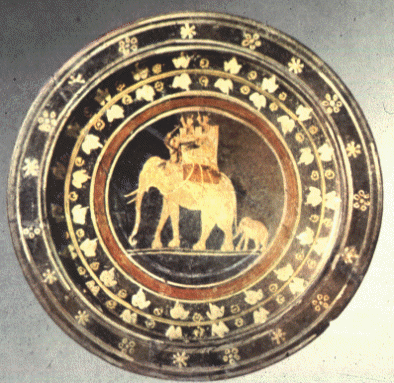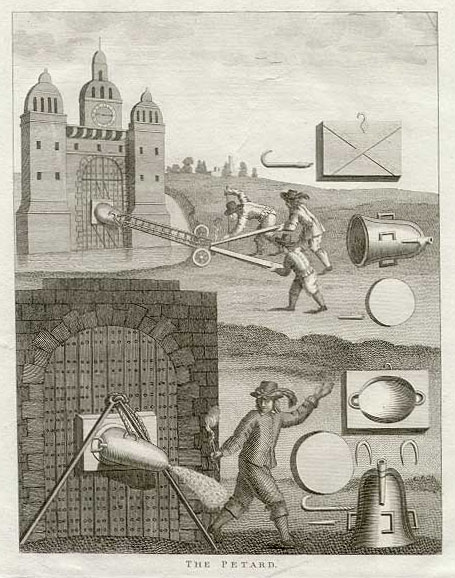Sunday, April 25, 2010
a pyrrhic victory
Okay, I know what a pyrrhic victory is. Basically, it's when you win the battle but lose the war. Or when, in broader terms, your very success defeats you. Say you argue your girlfriend into the ground with your superior logic and feel very satisfied at having trounced her soundly, until you notice that she's got her suitcase packed and is headed out the door. That's a pyrrhic victory.
But until I read a comment on Girish Shahane's excellent blog, I hadn't stopped to think a lot about where the term originated. Here's the sentence that brought this all up:
King Pyrrhus, after defeating the Romans at Heraclea in 280 BC, is supposed to have said, "If we are victorious in one more battle, we shall be utterly ruined".
So what happened? Sure, the vast throngs of Latin scholars reading this blog will already know the answer to this, but what about that miniscule remnant who are not in fact historians? So what went wrong, King Pyrrhus? Did you pull back from the mad path of victory? I for one am guessing probably not.
...Well, it's all a bit complicated. Basically, he was called in to help a city that felt its treaty with Rome had been violated, and Pyrrhus was under obligation to come to their aid. But he wasn't just acting benevolently, he was also seeing an opportunity for empire expansion. One of the interesting things he had on loan as part of his military arsenal was a squad of twenty elephants. The elephants helped with his victory, although one wounded one caused havoc by panicking all the other elephants, making his triumph not as complete as it otherwise would have been. (Pay attention, because this is what is known in the literary world as Foreshadowing.)
Although Pyrrhus after two victories tried to negotiate with Rome, Rome wasn't having any of it till he got out of Italy. Which of course didn't totally exist yet, but there were a lot of Italics, uh, I mean Italics, running around the place so it was almost as good as the real deal. Rome banded with Carthage, briefly, to pack him off, though of course they'd be fighting amongst themselves in no time at all. Pyrrhus took a road trip to Sicily where he tried to help the Greek colonies, but no such luck. In 275 BC, he faced the Romans in a town called Maleventum. It means Bad Event--didn't he get the smallest portent from that? Well, he started out urged on by the Oracle at Delphi, who didn't seem to have given him the greatest advice, so maybe he was tired of reading the signs. Anyway, Rome won. They had figured out how to deal with the elephants. They hurled short spears into their sides, causing them to run amuck and trample their own troops. Although personally, I doubt the elephants identified overmuch with their own team in the first place. The Romans of course renamed the place Beneventum, or Good Event--rather grinding home the point, I'd say.
Pyrrhus returned home with much diminished troops and with not much to show for all his military adventures. He had apparently been pretty much the only hope to stem Roman expansion, and his real problem had been that he did not have the endless flow of troops that Rome turned out to have at its disposal. Back home, he got caught up in a civil dispute in Argos, and tradition has it that he was stunned by an old woman on a roof throwing down a tile on him, leaving him an easy mark for his enemies.
How come the Oracle of Delphi didn't warn him about that?
(Oh, I guess I should that if you are more interested in strategy than elephants, you should probably read Plutarch. Or, failing that, Wikipedia.)
Friday, April 16, 2010
petard, or that upon which one is hoisted
When I come across the same not so common phrase within a couple of hours, it gets me reflecting. I do know what it means to be "hoist upon one's own petard". It means something like, to be skewered by one's own argument. And I also believe, though with less confidence, that the petard in question is some sort of sword or lance, something in other words that one could be impaled upon. But that doesn't mean that I know what a petard is more specifically, or how this rather technical phrase passed into our more usual vernacular. Shall we find out?
...Wrong again, Watson. But I'm sure that any French speakers among us already know that. Also, closer readers of Shakespeare than I am, apparently. My long held imagery blown up in an instant.Not a soldier tripping on his sword on the battlefield, but rather an 'engineer'falling victim to his own contraption.To be hoist on one's own petard is to be blown away--quite literally.
A petard is a bomb. Not a high tech bomb, because the word dates back a few centuries. It was the kind of bomb back then that was planted to breach walls and blast through gates. Gunpowder inside a metal container and with a slow fuse usually did the trick. Emphasis on usually.
The word comes from the Middle French peter, "to pass wind". In French, it remains a current word--it's the name for firecracker, and more slangily, either a joint or a pistol. It crossed the Channel in time for Shakespeare to use it in one of his greatest plays, which is why we know it, and why I should have known its true meaning before this (the variant spellings are his, not mine) :
Let it work;
For 'tis the sport to have the enginer
Hoist with his own petar; and 't shall go hard
But I will delve one yard below their mines
And blow them at the moon
For those who don't already recognize it, that's a princely fellow foiling the plans of a couple of school chums. That's all I'm saying.
...Wrong again, Watson. But I'm sure that any French speakers among us already know that. Also, closer readers of Shakespeare than I am, apparently. My long held imagery blown up in an instant.Not a soldier tripping on his sword on the battlefield, but rather an 'engineer'falling victim to his own contraption.To be hoist on one's own petard is to be blown away--quite literally.
A petard is a bomb. Not a high tech bomb, because the word dates back a few centuries. It was the kind of bomb back then that was planted to breach walls and blast through gates. Gunpowder inside a metal container and with a slow fuse usually did the trick. Emphasis on usually.
The word comes from the Middle French peter, "to pass wind". In French, it remains a current word--it's the name for firecracker, and more slangily, either a joint or a pistol. It crossed the Channel in time for Shakespeare to use it in one of his greatest plays, which is why we know it, and why I should have known its true meaning before this (the variant spellings are his, not mine) :
Let it work;
For 'tis the sport to have the enginer
Hoist with his own petar; and 't shall go hard
But I will delve one yard below their mines
And blow them at the moon
For those who don't already recognize it, that's a princely fellow foiling the plans of a couple of school chums. That's all I'm saying.
Sunday, April 11, 2010
catamount
As I noted a couple of posts back, I got thrown a bit in figuring out "tantamount", making it harder than it had to be, by conflating it with words like "catamount". Catamount is one of those words that you come across really only by reading, and, I would venture, not by a steady diet of contemporary fiction. So much so that I don't think I could come up with a good example off the top of my head. From my vague memory of context, though, I'm going to venture that this is some kind of wild cat, maybe like a bobcat or linx. Is it something so simple as 'cat of the mountains'?
Unfortunately, I seem to have this mixed up in my mind with "catamite". I have an either vaguer sense of what that means, but I'm pretty sure it's not something you will come upon while traipsing through the mountains.
...Yes, in this instance, I was pretty much right. It seems to refer to any of a number of small, shorttailed wild cats, and in this category bobcats and lynx are included. And yes, it is a contraction of 'cat of the mountain'. It's not, like 'tantamount,' a Latin compound at all. In etymology, beware of resemblances.
Unfortunately, I seem to have this mixed up in my mind with "catamite". I have an either vaguer sense of what that means, but I'm pretty sure it's not something you will come upon while traipsing through the mountains.
...Yes, in this instance, I was pretty much right. It seems to refer to any of a number of small, shorttailed wild cats, and in this category bobcats and lynx are included. And yes, it is a contraction of 'cat of the mountain'. It's not, like 'tantamount,' a Latin compound at all. In etymology, beware of resemblances.
Wednesday, April 7, 2010
targum
Another case of Finnegans Wake having gotten the better of me. Here's the sentence:
The quad gospellers may own the targum but any of the Zingari shoolerim may pick a peck of kindlings yet from the sack of auld hensyne.
As may be clear, with Joyce, you tend to rather seize upon the things that you think you may have a slight clue on, which in the case of 'targum' isn't saying all that much.
 I did have a sense that 'targum' has a connection to Jewish teachings, probably commentary of some sort. We did discover that this was more or less right, but the most precise definition already eludes me, so I'll look it up again in a moment.
I did have a sense that 'targum' has a connection to Jewish teachings, probably commentary of some sort. We did discover that this was more or less right, but the most precise definition already eludes me, so I'll look it up again in a moment. Here's the thing, though. Somehow, I have the idea in my head that the targum goes back to these little pieces of parchment or sheepskin or something that were then pasted together or glued in--I don't know. So my real curiosity here is, first, did I make that up out of whole cloth--or maybe sheepskin--and second, what is the origin of the word, since I am most likely totally wrong?
...Okay--whole cloth. What targums really are are translations, or at least explanations of Hebrew scriptures to those who had lost facility in the original language. They came into being in Jewish communities existing within larger communities where the lingua franca was Aramaic, and where people might use Hebrew only in worship. You can find a much deeper discussion of all this here. I am sorry to say it has nothing to do with sheepskin.
Subscribe to:
Posts (Atom)

































